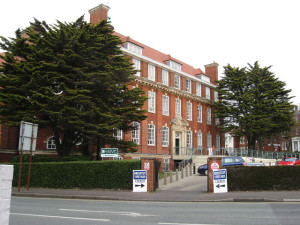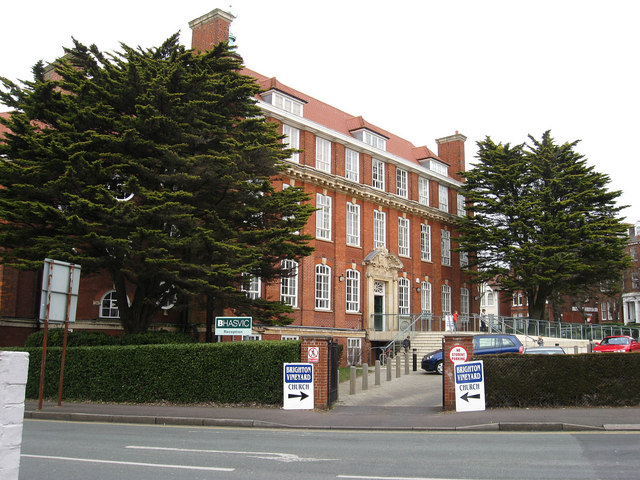Brighton, Hove and Sussex VI Form College (BHASVIC) is exploring the possibility of becoming an academy, a council meeting was told this afternoon (Monday 3 October).
The prospect could face opposition – a previous proposal at Hove Park School was withdrawn two years ago after a vociferous campaign by parents and politicians.
But BHASVIC’s chairman of governors Peter Freeman shared details of the government’s advice for sixth form colleges on becoming a 16 to 19 academy with fellow governors at a meeting in March.
They discussed the advice in the confidential part of the meeting of the corporation – BHASVIC’s governing body.
A formal decision could be made at a special meeting of the corporation on Wednesday 9 November when the governors are due to discuss the government’s area based review (ABR) of post-16 education.
The government advice discussed by the governors in March arose from an announcement in the Chancellor’s comprehensive spending review statement in November last year. The former Chancellor, George Osborne, offered tax breaks for sixth form colleges that convert to academies.
BHASVIC, which has more than 2,000 students, about 200 staff and an annual budget of more than £11 million, would benefit financially from the incentives.

The prospect of becoming an academy also arose as BHASVIC’s governors discussed the area base review, also known as the Sussex area review.
The review is looking at further education colleges – such as City College – and standalone sixth form colleges such as BHASVIC and Varndean.
Members of Brighton and Hove City Council were told this afternoon that the area review had still not been published although it had been expected in June.
The council is carrying out its own review of post-16 education and has included school sixth forms as well. It will share its views with the government’s review.
The situation was discussed by the council’s Children, Young People and Skills Committee at Hove Town Hall this afternoon.
Varndean College has decided against becoming an academy. Although it has between 2,000 and 3,000 students, more than 150 staff and an annual budget of more than £8 million, it would not benefit in the same way as BHASVIC from the tax inducements offered by the government.
Councillors were told that City College Brighton and Hove was moving forward with its proposed merger with Northbrook College, Worthing.

Councillor Lloyd Russell-Moyle sounded a note of caution. He said: “I would be very worried about the merger of City College and Northbrook.
“I wouldn’t want City College which is very good to be distracted by becoming a bigger institution.”
He said that it would be important to keep an eye on any merger so that young people in Brighton and Hove weren’t disadvantaged by such a move.
He said that other further education colleges – Central Sussex and Sussex Downs – had performed poorly after mergers.
The council review of local sixth forms took place against a backdrop of pressure from the government to look at ways to collaborate more “to help drive efficiencies”. And ministers are reluctant to fund sixth forms with fewer than 200 students.
Councillor Tom Bewick, who chairs the committee, questioned whether some local school sixth forms – all much smaller than BHASVIC and Varndean – were financially viable. He is also concerned that, rather than add to student choice, they dilute the quality of the choices on offer.
The committee agreed that, while decisions rest with boards of governors, schools and academies should consider the future financial viability of their sixth form provision.
Governors were urged to improve numbers, merge or close their sixth forms and review their specialisms, with a suggestion that there was also too much duplication.
BHASVIC and Varndean College both have well over 2,000 students each. In the past academic year Cardinal Newman had 453 students, Hove Park had 266, Blatchington Mill had 163, the Portslade Aldridge Community Academy (PACA) had 129 and the Brighton Aldridge Community Academy (BACA) had 50.
The numbers at BACA in the current academic year are reported to have risen substantially and the two Aldridge schools are recruiting jointly to a cluster of specialist sixth form academies, focusing on, for example, cricket and dance.
Hove Park and Blatch have been collaborating, with the two schools offering a joint curriculum from the start of the current academic year.








This upsets me.
BHASVIC was created as a grammar and has a truly illustrious history – it is a very special school. The Government is now about to create a lot of new Grammars and ideally, this Institution should go back to being a Grammar School.
As someone myself who was A-streamed, age 12, going into high school, age 13, in Canada, many years ago, and looking back now on how that went, I am clear I belonged in a Grammar. But Canada had no Grammar Schools.
Had I been in a Grammar School, I might not have been so easily distracted by non-academic imperatives – and as my homelife was actively anti-academic as well, I was never going to have the srength to value and use the academic potential I had.
I see Grammar Schools as safe havens for young brains….as places of containment and places of influence which can counter and balance the judgment of young minds so boys, clothes, social life and squandering of time do not dominate teen years. Grammars provide the kind of structure for minds capable of academic work which may be entirely missing at home or environment.
My poor brain had to wait a long time for appropriate acknowledgment from me!
In class-obsessed Britain, the idea that Grammars are about us and them class division is really pretty sick. Nothing is sadder than not being who and what you are and what needs to change is the way that is judged and valued. Too many go to Uni for the wrong reason and do it for class obsession, social ladder climbing reasons. Pathetic. They are not there for the sheer obsessive need of learning and thinking within academic fields. And this world needs other kinds of learning and knowing just as much.
And get rid of the 11+. That is the wrong age and just puts people in competition with each other. My primary schooling lasted till age 12 with 4 years of high school from 13. We did 12 graded years from age 6 with kindergarten before that. Grade 13 was for those going on to university.
We did not choose a couple of subjects for those high school years. We did EVERYTHING. Science for A-streamers, for instance, was broken up so Grade 9 was botany, Grade 10 biology, Grade 11 physics, Grade 12 chemistry. English was grammar, composition and literature and NOBODY was illiterate that I ever encountered.
You did not pass into the next grade automatically as in the UK. You had to pass each subject from age 6 onwards to a certain graded standard or repeat the year and see classmates go ahead of you. Another HUGE incentive to learn. NOBODY got into high school in 1960’s Canada unable to read and write, incapable, in other words, of taking things in properly!
This country is SCREWING the future of its children by failing to ensure literacy, proficiency in spelling and pronunciations AS THEY GO ALONG. And for universities to now be forced to lay on classes in grammar, composition and essay writing for first year intakes is embarrassing.
The future of this country depends on shaping up at the education level and that to me means ensuring teachers are well educated and capable, that self-discipline is the core skill kids learn in order to be able to learn anything else! I just see chaos right now.
When I was a Primary school, my teachers, regular tests and various things like IQ testing (which we did not see as onerous)gave teachers clear ideas of our capabilities. We were graded on report cards taken home to parents for them to see and sign quite regularly too. Those report card days were jittery and a huge incentive to do the work.